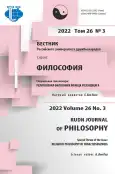An Old Annex, Long since Unhabitable: The Critique of Practical Reason as an Offspring of Architectonic Classicism
- Авторлар: Sudakov A.K.1
-
Мекемелер:
- RAS Institute of Philosophy
- Шығарылым: Том 26, № 3 (2022): RELIGIOUS PHILOSOPHY OF FRANZ ROSENZWEIG
- Беттер: 623-643
- Бөлім: CLASSICAL GERMAN PHILOSOPHY
- URL: https://journal-vniispk.ru/2313-2302/article/view/325313
- DOI: https://doi.org/10.22363/2313-2302-2022-26-3-623-643
- ID: 325313
Дәйексөз келтіру
Толық мәтін
Аннотация
The Critique of Practical Reason is traditionally regarded as one of Kant’s central works on practical philosophy. Its structural and stylistic parallels with the Critique of Pure Reason sustain one’s conviction about its fundamental systematic relevance in Kant’s ethics. Nevertheless, the compositional sketch of the system of critical philosophy in the first Critique does not presume any separate critique of reason in its practical use. This inspires to investigate the question of the sense and aim of the critique of practical reason in Kant’s main works of the 1780s. Such an investigation discovers, that the concept of such a critique emerges in Kant’s Groundwork for the Metaphysics of Morals, which intends to find and to establish the supreme principle of pure morals, to supply its full-value deduction and insofar to present a sufficient introduction to the system of moral metaphysics. It is for the purpose of such a deduction, which demonstrates the normative validity and truth of categorical imperatives, that Kant considers a transition to a critique of practical reason necessary. And yet this transition as well as this critique are presumed to take place within the subject field of the Groundwork itself: the main features of the practical critique of reason as described in the Groundwork III are, according to Kant, sufficient for the purpose of justification of critical morality. If, however, the deduction of the moral law given in Groundwork III should fail, no possible future “progress of metaphysics” could compensate this failure, - because this deduction occurs at the «extreme boundary of all practical philosophy”, beyond which lies the realm of moral faith. Kant scholars consider the concepts of the “fact of pure reason” and the doctrine of the highest derivative good as crucial innovations of the second “Critique”. There are however reasons enough to dispute the question as to whether both doctrines really make for an innovation - and for an advance.
Авторлар туралы
Andrey Sudakov
RAS Institute of Philosophy
Хат алмасуға жауапты Автор.
Email: asudakow2015@yandex.ru
ORCID iD: 0000-0001-7531-6024
Dr. Sc., Philosophy, Senior Researcher
12/1, Goncharnaya Str., Moscow, 109240, Russian FederationӘдебиет тізімі
- Paulsen Fr. Immanuel Kant. His life and his doctrine. Lossky NO (tr.). Saint-Petersburg: Obshestwennaya Pol’sa; 1905. (In Russian).
- Kalinnikow LA. Problems of philosophy of history in Kant’s system. Leningrad: LGU Publishers; 1978. (In Russian).
- Asmus WF. Immanuel Kant. Moscow: Nauka; 1973. (In Russian).
- Gulyga AW. Kant. Moscow: Molodaya Gwardiya; 1977. (In Russian).
- Klemme, Heiner F. The Origin and Aim of Kant’s Critique of Practical Reason. In: Kant’s ‘Critique of Practical Reason’. A Critical Guide. Reath A, Timmermann J, editors. Cambridge: Cambrdige University Press; 2010. P. 11—30.
- Ludwig B. ,Die Kritik der reinen Vernunft hat die Wirklichkeit der Freiheit nicht bewiesen, ja nicht einmal deren Möglichkeit.‘ Über die folgenreiche Fehlinterpretation eines Absatzes in der Kritik der reinen Vernunft. Kant-Studien. 2015;106(3):398—417. https://doi.org/10.1515/kant-2015-0038
- Kant I. Critique of pure reason. Lossky NO (tr.). Moscow: Nauka; 1998. (In Russian).
- Kant I. Groundwork of the Metaphysics of Morals. Kant I. Works in Russian and German languages: in 4 vols. Motroshilova N (Moscow), Tuschling B (Marburg), editors. Vol. III. Moscow: Moskovskij filosofskij fond; 1997. P. 38—275. (In Russian).
- Kant I. Critique of Practical Reason. In: Works in Russian and German languages: in 4 vols. Motroshilova N (Moscow), Tuschling B (Marburg), editors. Vol. III. Moscow: Moskovskij filosofskij fond; 1997. P. 276—733. (In Russian).
- Kant I. Metaphysik der Sitten. In: Werkausgabe in 12 Bänden. Hg. von W. Weischedel. Bd. VIII. Berlin: suhrkamp taschenbuch verlag; 1997. S. 305—634.
Қосымша файлдар









